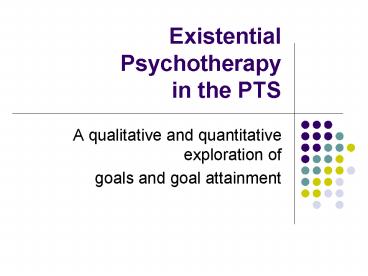Existential Psychotherapy in the PTS - PowerPoint PPT Presentation
Title:
Existential Psychotherapy in the PTS
Description:
Existential Psychotherapy in the PTS A qualitative and quantitative exploration of goals and goal attainment Introduction Existential psychotherapy The NHS climate ... – PowerPoint PPT presentation
Number of Views:365
Avg rating:3.0/5.0
Title: Existential Psychotherapy in the PTS
1
Existential Psychotherapy in the PTS
- A qualitative and quantitative exploration of
- goals and goal attainment
2
Introduction
- Existential psychotherapy
- The NHS climate
- Evidence-based psychotherapies
- Different types of evidence
- Evidence-based practice and practice-based
evidence - Qualitative and quantitative research
- Goals in psychotherapy
3
Research questions
- What are the goals of clients receiving
Existential Psychotherapy in the Psychological
Therapies Service (now the Complex Care Team)? - Is clients level of psychological distress any
different after therapy? - To what extent do clients feel that each of their
goals has been met after being offered
approximately 16 sessions of existential
psychotherapy? - Is the level of goal attainment linked with
levels of psychological distress, or with number
of sessions attended?
4
Method
- Participants
- n 30, 21 women, 8 men, 1 unrecorded gender.
- Aged 19-60 years (µ 43)
- 30 white European or white other, 70 no data
- Measures
- CORE goal attainment form
- At start of therapy clients write down up to 4
goals/difficulties they want help with. - At end of therapy rate extent to which therapy
helped with each difficulty/goal - CORE-OM
- 34 items, 4 domains, overall score of
psychological distress. - Other measures not studied here CORE-5
5
Results
- Descriptive statistics
- Average 4.5m in therapy, attended 12 sessions
(ranging from 1 to 24 sessions). - 20 participants attended a full course of
therapy, for 8 therapy ended early and no data
for 2.
6
CORE-OM
- 75 of clients completed at start, 62.5 at end
of therapy. - Clients had significantly lower scores at the end
of therapy than at the start, showing a reduction
in their distress. - Before (M 22, SE 1.4), After (M 16.50, SE
1.5), t(19) 3.45, p .003 - CI (95) 2.16 8.84.
- Medium to large effect, d .77 or r .63.
- Reliable change (Jacobson Truax, 1991) for 20
clients - reliable change, less distress 11 clients (55).
- reliable change, more distress 1 client (5).
- no reliable change 8 clients (40).
7
- No link between post-therapy CORE-OM scores and
Level of goal attainment - (for both mean and best level of goal attainment
per client) - But there is a link between post-therapy CORE-OM
scores and goal attainment for Goal 1 - (Spearmans Rho -.586, p .028)
- Goal 1 is probably a clients most important goal
- No link between post-therapy CORE-OM scores and
number of sessions attended - (r .27, p .26).
8
Goals Thematic analysis
- 25 participants wrote down a total of 77 goals (5
participants had no goal forms). - 60 of participants wrote down 3 or more goals.
- Length 1 to 74 words (µ 11 words).
- 6 themes, some goals in more than one theme.
9
Themes and sub-themes
- 1. Self
- Acceptance
- Respect
- 2. Relationships
- Family
- Attitude
- Roles
- Independence
- Relating
10
- 3. Acceptance
- Past
- Present
- Future
- 4. Making changes
- Building a future
- Embrace life
- Behaviour
- 5. Feelings
- More positive feelings
- Fewer negative feelings
- 6. Miscellaneous
11
Goals quantitative analysis
- Of all 30 clients
- 83 wrote at least one difficulty at the start,
60 (20 clients) rated a total of 57 goals at the
end of therapy (20 goals unrated), on this scale - How much did therapy help you with
this difficulty? - 0 1 2
3 4 - Not at all A little bit
Moderately Quite a bit Extremely - Of these 20 clients
- most (78) wrote down three or more goals for
therapy.
12
Goal attainment All goals
13
Goal attainment per client Goal 1
14
Highest level of goal attainment per client
15
Mean level of goal attainment per client
16
Discussion
- Strengths
- Combined quantitative and qualitative data
- High ecological validity
- Important time to gather this data
- Limitations
- No control group
- Incomplete data
- Small sample size
- Some goals not very detailed
- Difficulty separating themes - all interlinked
- My inexperience with Existential Psychotherapy
17
- Recommendations
- Good outcomes, pat on the back!
- Continue to help clients achieve their goals,
through Existential Psychotherapy, particularly
their main goal (Goal 1). - Therapists to value data collection - integrate
more in therapy, not just tick-box exercise. - Thorough goals at start, re-rate at end.































